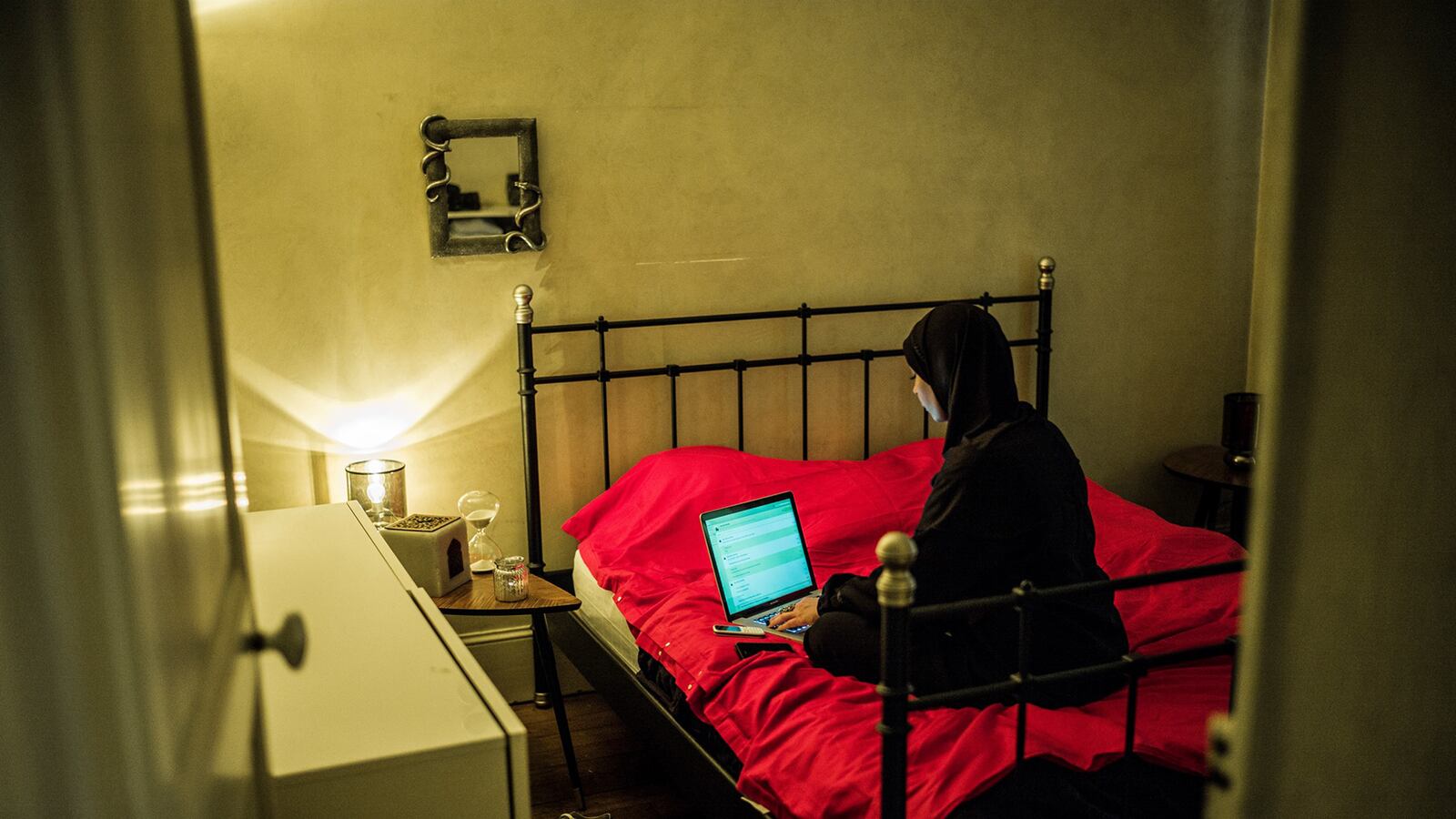“I had regular cyberdates with a French jihadist in Syria,” writes Anna Erelle.
For years, Erelle, a French journalist, has probed into the circumstances that persuade Western-raised youth to believe online propaganda, cut ties with their families, and join remote extremist causes. (According to statistics published in The Guardian in 2014, an estimated 15,000 foreign fighters have joined ISIS since 2010, more than a thousand of them from France.)
Affected by conversations she had with families reeling in the wake of their kids’ abrupt and inexplicable departures, Erelle investigated how social media functions as a conduit for radicalism. Several years ago she created a faux online persona, “Mélodie,” a 20-year-old convert to Islam from Toulouse whose profile consisted of reposted propaganda videos and a Princess Jasmine (from Aladdin) avatar. Through this Facebook presence, she tried to understand how Islamic militants brainwashed and manipulated vulnerable youth, notably women.
Though primarily an online observer, Erelle-as-Mélodie was one day contacted directly by a high-ranking militant for the Islamic State in Syria.
Abu Bilel al-Firanzi turned out to be the French-born right-hand man of Abu Bakr al-Baghdadi, self-proclaimed caliph of ISIS. Bilel had a penchant for chocolate milk and M4 assault rifles, and interspersed smiley faces into his written boasts of mass murder.
“The stunning grammatical errors barely distracted from the force of his conviction,” Erelle noted. Bilel had honed guerilla tactics in Afghanistan, Pakistan, and Libya. Within days of first contact he was obsessing over Mélodie, messaging her incessantly, browbeating her to come to Syria and marry him, and do jihad. She had interviewed mujahideen as a reporter, but she’d never interacted with anyone experienced enough to spout any hard information. This militant’s commanding position was confirmed by his accessibility to her: “in a country that barely had electricity and water, he had the latest technology,” Erelle noted. She engaged with him regularly to the point of organizing a trip to meet him at the Turkish border, before pulling out of the situation.
Erelle describes her month-long experience in the world of digital extremism in chilling detail in In The Skin Of A Jihadist, a deception that required her to wear a burqa when she Skyped and forced her to acquiesce to anything a barbarian wanted to hear.
Erelle is still dealing with the fallout of having encouraged and then humiliated a sought-after terrorist: in the wake of her deception, she had to change many elements of her identity. Undeterred, she still adamantly insists that the roots of “digital jihadism” must be exposed in order to prevent gullible young people from being lured into and trapped by lives of violence. In a telephone interview with The Daily Beast, she discussed her experiences and her fears about Western society, particularly her worry that the West habitually reacts to the dire threats of extremism when it’s already too late.
How were you first drawn to exploring this online world?
There was this digital aspect that was startling. Terrorism is normally dark, opaque … suddenly it finds itself on social networks where everyone sees it, including adolescents. I found that completely crazy. I searched, since it had been a while that I’d already worked on Islam and radicalization, and it wasn’t the same rapport online—not the same way of thinking, or the way that people were radicalizing or taking up religion. I wanted to know more. I don’t think people realize the degree to which we have already entered into a war—with fanatics and with the personal interests of countries that have nothing to do with religion, but with oil.

How does your book differ from the initial article you wrote and published in France?
It’s different in the sense that [as a journalist] you don’t put your state of mind into it. Your goal is to be a neutral voice. And what I did in the book is put this personal aspect about what was happening to me in parallel [with what I was reporting]. It’s more about how I lived the experience. And that’s where it creates a different dimension for the reader, who realizes how quickly things happened, and witnesses how my life was turned upside down in tandem.
Indeed: In one part you state that, in this story, the “journalist is also the protagonist.” When did you make that decision?
I didn’t want to write a book initially, because I was already being threatened, and I thought it would provoke even more problems to write a book. I was asked several times, and I said no. I continued receiving threats. After a few weeks I went abroad for a month and a half. And that’s when I discovered there was a fatwa. I was scared—but I also had this reflex of anger. I’m being threatened, my loved ones are being threatened … I will tell my truth!
I was told: Since you don’t have much distance, write about your life. It’s not an exercise I give myself over to, because as a journalist the first thing you learn is to be neutral. I still had everything swimming around in my head, and in fact it was very impulsive writing, fretful. That’s how I did it—there was no personal goal to do so at the beginning. Now I see how it’s important for a reader to understand what’s happening outside the article—the real incidents that happen to a person who wants to do their jihad.
You say: “New technologies have of course bred new forms of proselytism.” Can you expand on how you traced this?
My [fake] account was to do research, not to trap anyone. But I ended up using it to be an observer of francophone—and anglophone too in fact—adolescents who wanted to go [to the Middle East]. It’s terrifying, because in the beginning [the forum] was a call to religion, but it grew to be à la carte. Especially with women, the radicalization was huge. Eight-ten years ago, you didn’t even see burqas in the streets in France. Today, things have vastly changed, and digital changes with it. With religion, the malaise is that people need to belong to something. Religion gives them the impression of that, of living in a more accessible, less individualist world.
But as you talk about evolving, what’s being put forth is a medieval version of Islam—how does that have any resonance in this day and age?
People have trouble situating themselves. They want to be in communities, individualism is so rampant—we see that outside of religion. But there are enormous divisions within Islam itself. Even rallying around a religion—there are too many differences within it. So in the end, the best way is to rally around something radical to really show one’s allegiance, to really separate oneself, and, voilà. The people who leave don’t believe anymore in the world we live in. They think they need to be elsewhere to live the good life.
As an intelligence agent in your book is cited as saying: “We can’t watch everyone who spends time in these religious countries … Either people tell us we’re incompetent, or they accuse us of Islamophobia.” What’s the way forward?
It’s always easy to say later, but we should’ve intervened way before. It’s not 6-12 months we know that they’re online—it’s been three years. Minimum. We’ve seen the rise of this phenomenon in Europe, and yet where we’re at now is where we were last year. We didn’t discover this with Charlie Hebdo—we’ve known about this. It should’ve been addressed earlier.
We can’t police everyone on the Internet—I agree. But we should police the people who try to bring people over, and that should’ve been done earlier. It’s not normal that in this day and age, with all the attacks over the last 15 years, that an army can have as much influence over the Internet—and we let them get away with it. On my [fake account], there were hundreds of fanatics, who were public, who called for murder, who threatened their country of origin. Prevention was possible earlier. When I started interviewing the families of children who’d left for Syria, and they would go to the police station, the police would look at them bug-eyed and say, “What do you want us to do?” There was no support. We should’ve declared war on Bashar al-Assad years ago. There would be enormous collateral damage, but it wouldn’t have been in vain. People who go there now are just cannon fodder.
In the wake of Charlie Hebdo, do you think France is mobilizing differently, since the country has seen the effects of radicalization on its own soil and had to confront it?
It’s never too late—I’m an optimist—but there’s an enormous problem that it takes a terrorist act to make people understand the [phenomenon of radicalization]. My own investigation happened before Charlie Hebdo, and the authorities were aware of it.
You’ve been in America discussing the book. Is the reception different than in France?
I’m often asked if I took too many risks with the investigation. I feel like that’s an unfortunate question. I’ve taken fewer risks than people on site. Otherwise, what I’m surprised about is that I’m not saying anything new, yet people think they’re learning new information. That is upsetting. We’re deluged with information in the press about jihads, but consciousness is raised only when there’s an attack. It’s sad that it’s after and not before, when we already have key information.






